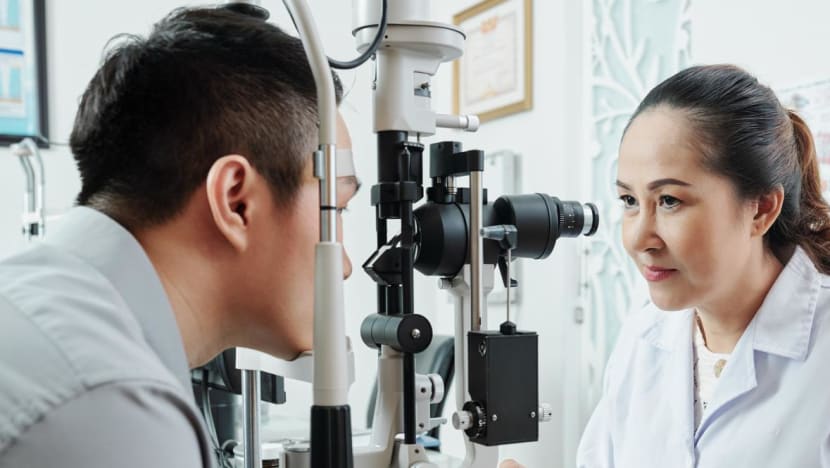Commentary: Sufferers of this little-known eye disease pay a price by looking normal
Age-related macular degeneration (AMD) robs sight yet leaves the afflicted looking none the worse. Sufferers can ghost through their lives without anyone knowing they are visually handicapped, says Macular Degeneration Society Singapore president Peh Shing Huei.

SINGAPORE: Towards the end of a focus group discussion in August in Khoo Teck Puat Hospital (KTPH) with patients and caregivers of age-related macular degeneration (AMD), the moderator tossed out a fairly provocative question.
He asked: “Unless you inform them, no one can actually tell that you have AMD. Is that good or bad?”
The reactions were fast and furious. Unanimously, the five participants replied that it was definitely bad. “People think we are normal and don’t need help. But actually we do!” said an elderly man.
The curse of AMD and other macular diseases is that it is, ironically, an invisible problem. While a sufferer’s central vision has been damaged and his vision compromised, he usually looks perfectly normal to a bystander. There are no bloodshot eyes, no dilated pupils or any semblance of abnormality in the eyes.
THE PRICE OF LOOKING NORMAL
While glaucoma has been called the “silent thief of sight” because it slowly damages eyes with no obvious symptoms during the early stages, macular degeneration is its invisible cousin that robs sight yet leaves the afflicted looking none the worse.
This creates problems for sufferers of this eye disease, which is the most common cause of severe loss of eyesight among people 50 and older in the Western world. The macula processes central vision, making it the most important and useful part of your retina.
Macular degeneration occurs when delicate cells in the eyes are damaged, usually as a result of old age, and at times because of high myopia.

Early symptoms include distorted lines and blurring of images. As it worsens, imagine seeing a big, dark spot smack in the middle of your vision, no matter where you look. Eventually, sufferers may be unable to see faces, drive or read. While they rarely go completely blind from macular degeneration, they would lose most of their usable vision.
Given the high incidence of myopia in Singapore, anecdotal accounts from the support group Macular Degeneration Society of Singapore (MDS) suggests a larger proportion of such macular degeneration sufferers here compared to other countries. The risk of developing myopic macular generation depends on the severity of myopia, and the risk increases with age.
AMD SUFFERERS PREFER THE INVISIBILITY
It is estimated that a quarter of Singapore’s elderly population are affected by AMD – but this is a rough estimate due to lack of formal research.
But even as the patient’s vision deteriorates, he is a picture of normalcy to others. Some prefer such invisibility and will not tell or indicate to others that they are visually handicapped. Often, they are afraid of the stigma that comes with it, potentially hurting their employment and career opportunities.
When they step into lifts and cannot see the numbers on the buttons, neighbours do not offer to help. When they are confounded at bus stops because they are unable to read the bus numbers, fellow passengers ignore them. Some ask for assistance; others prefer not to out of embarrassment.
Many settle into homebound lives with little mobility. Social circles shrink quickly and their mental health invariably suffers. Depression is common among macular degeneration sufferers, based on findings by KTPH’s clinical psychologists.
RAISING AWARENESS OF LITTLE-KNOWN CONDITIONS
The invisibility of AMD, along with the silence of those afflicted, has kept the condition under the radar. A survey in 2011 in Singapore found that 28 per cent of respondents were familiar with AMD.
As we celebrate World Sight Day on Oct 13, what would shed light on little-known illnesses like macular degeneration?
Take Parkinson’s Disease as an example. Awareness of the illness spiked after a badly trembling Muhammad Ali lit the Olympic torch at the opening ceremony of the 1996 Atlanta Games. The scene was beamed around the world on live television.
It received another major awareness boost three years later when Hollywood star Michael J Fox, who also has Parkinson’s, appeared on a United States Senate hearing trembling and twitching visibly and badly.
He said after that: “I had made a deliberate choice to appear before the subcommittee without medication. It seemed to me that this occasion demanded that my testimony about the effects of the disease, and the urgency we as a community were feeling, be seen as well as heard.”
Fox was criticised by some for his admission. But such is the extent that illnesses and diseases had, and probably still have, to go to in order to shock the world into recognition and action.
MORE RESEARCH AND OUTREACH NEEDED ON AMD
In the KTPH focus group discussion, almost all the patients had never heard of AMD before they were diagnosed. The lack of awareness among patients and caregivers heightens their anxiety in dealing with the condition.
Sharper awareness requires information to begin with. For instance, the state of macular degeneration here needs more data, especially in a rapidly ageing society. We don’t know what we don’t know.
A fresh nationwide survey backed by authorities and corporates would provide information on the number of sufferers, their major concerns and misconceptions. This would allow for more targeted measures in supporting patients and caregivers, and plugging gaps in awareness campaigns.
Meanwhile, healthcare authorities and providers could engage in more grassroots outreach – for instance, void-deck talks in mother tongue languages that run throughout the year in ageing estates. They can educate the public on how a healthier diet and active lifestyle help reduce the risk of AMD.
Macular degeneration needs an Ali or Fox moment, but in the absence of one, we as a community must work hard to draw attention to a debilitating disease.
Peh Shing Huei is Co-founder and President of the Macular Degeneration Society (Singapore). He is also a journalist and an author.


















